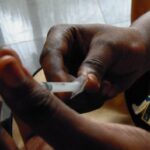Hypoglycemia is a medical emergency that involves an abnormally diminished content of glucose in the blood.
The term literally means “low blood sugar.” It can produce a variety of symptoms and effects but the principal problems arise from an inadequate supply of glucose to the brain, resulting in impairment of function.
Effects can range from mild dysphoria (is a profound state of unease or dissatisfaction) to more serious issues such as seizures, unconsciousness, and (rarely) permanent brain damage or death.
The most common forms of hypoglycemia occur as a complication of treatment of diabetes mellitus with insulin or oral medications. Hypoglycemia is less common in non-diabetic persons, but can occur at any age.
Among the causes are excessive insulin produced in the body, inborn error of metabolism, medications and poisons, alcohol, hormone deficiencies, prolonged starvation, alterations of metabolism associated with infection and organ failure.
Hypoglycemia is treated by restoring the blood glucose level to normal by the ingestion or administration of dextrose or carbohydrate foods. It is often self-diagnosed and self-medicated orally by the ingestion of balanced meals.
In more severe circumstances, it is treated by injection or infusion of glucagon. Let us look into more detail some of the practical ways of preventing hypoglycaemia.
Source: GhanaWeb












